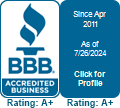Bookkeeping for 501c3 Organizations
Even though your 501c3 nonprofit organization is income tax-exempt with the IRS, you must file a yearly tax return. The easiest way to make sure you tax return is accurate each year, is to have an efficient bookkeeping system. Here are some basic tips for efficient bookkeeping throughout the year.
Know your fiscal year end. Most organizations choose December 31st, since it is also the calendar year end. But if your organization decided upon a different month as your year end, it is crucial to recall when that is. This will help when recording your data, as well as let you know when your year tax return with the IRS is due.
Keep track of your revenue and expenses. The revenues for 501c3 nonprofit organizations are different from most other types of businesses. These sources can include donations, program fees, sales income, membership dues, investment income, and proceeds from fundraising events. Whenever your organization receives revenue from any of the sources listed, you must keep detailed information about the revenue. For example, if a donor gives your organization a check, you will need to have the donor’s name and how much they donated. The expenses for your 501c3 nonprofit organization are also a bit different from for-profit businesses. These can include, but are not limited to, contributions to other charitable organizations, reimbursements, organization’s facility fees (utilities, rent), organization’s program expenses, and board of director’s compensation. Much like the revenue, these should be listed with details like what the expense is for, who it’s being paid to, etc. Keeping a good detailed list of your 501c3 organization’s revenue and expenses will be helpful for you in the future.
Keep records of your assets and liabilities. Your 501c3 nonprofit organization may acquire some assets over the year and it’s important to keep records of them. Assets for nonprofit organizations can include, but are not limited to, cash, inventory, land, buildings, vehicles, furniture, equipment, copyrights, and patents. Keeping detailed records of these will help your organization when filing your annual tax return with the IRS. Your 501c3 organization may also have liabilities throughout the year. For nonprofits, liabilities can include, but are not limited to, accounts payable, short-terms loans, and mortgages. Not only will keeping track of these make filing your tax return easier, it will also help your organization plainly see where your revenues are being used, as well as where they need to go in the future.
Use Quickbooks Online. Quickbooks online is a cloud based financial management software that offers many plans and features for your nonprofit organization’s needs. It is designed to help you spend less time managing your organization’s finances and more time on your 501c3 organization’s activities. By keeping all the finances in one place, Quickbooks makes bookkeeping easy.
A 501c3 nonprofit organization’s bookkeeping is the key to making sure the organization stays in compliance with the IRS. Keeping track of the organization’s revenue, expense, assets, and liabilities will help when filing your annual tax return with the IRS, and could help with other possible reports as well. It will also help you understand your 501c3 nonprofit organization’s money flow, which could help you know where you need to cut expenses or possibly have more fundraising activities. If you’re not too sure of the best way to keep track of all these, you can utilize Quickbooks online.





